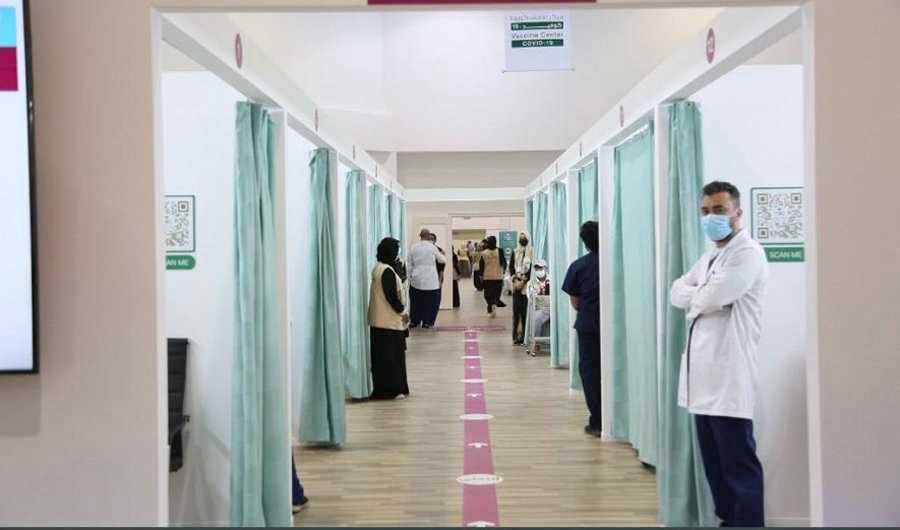JEDDAH: Saudi Arabia’s virus protocols are now mandating that employees across all sectors get vaccinated, but questions remain as to who cannot receive the lifesaving jab.
The Kingdom is on track to reach herd immunity after providing over 580 vaccine sites, and allowing residents to book a jab easily through the Ministry of Health’s (MOH) Sehhaty app.
The Ministry of Human Resources and Social Development (MHRSD) said on Friday that workers must be immunized as they return to office attendance, with some people exempt for health reasons.
The Ministry of Health (MOH) has urged all of the Kingdom’s residents to ensure they receive the vaccine and the exceptions are minimal.
“It’s difficult to numerate the people who should be exempt from taking the vaccine as each patient has their own story depending on subjectivity, and their medical condition,” Dr. Wail Bajhmom, an infectious disease consultant at the King Fahd Hospital, Jeddah, told Arab News. “If there are people at risk for an adverse reaction because of an allergy from the vaccine components this would be clear reason for exemption.” The MHRSD has not clarified the mechanisms of the decision and its implementation date.

The MOH has recently announced that getting a vaccine during pregnancy can protect women from severe symptoms if they become infected with the disease. (SPA)
Companies have allowed their employees to work remotely since the beginning of the pandemic. With Friday’s news, employers have processed medical exceptions with referrals from physicians and told employees that they can either take the vaccine and return to work, or take a COVID-19 test every week.
“The Human Resources Department has to apply the MHRSD recommendations effectively but some exceptions are necessary. We have exempted those who cannot receive the vaccine for medical reasons from receiving the jab and in-office attendance,” Mohammed Al-Subaie, an HR director of a private company told Arab News. “There are no other options, especially for those people who have a history of significant allergic reactions. They must present a medical report stating their condition and a referral advising against receiving the vaccine.”
Al-Subaie said that the company has always placed the health of employees as a priority and has exempted employees who are in the high-risk groups, such as pregnant women, from in-office attendance.
FASTFACTS
• The Kingdom is on track to reach herd immunity after providing over 580 vaccine sites, and allowing residents to book a jab easily through the Ministry of Health’s Sehhaty app.
• With Friday’s news, employers have processed medical exceptions with referrals from physicians and told employees that they can either take the vaccine and return to work, or take a COVID-19 test every week.
He added that individuals who have underlying health issues can continue working remotely from home.
The MOH has recently announced that getting a vaccine during pregnancy can protect women from severe symptoms if they become infected with the disease.
Numerous studies have indicated that the vaccine poses no harm to pregnant women or their unborn children and have shown that infection could cause complications.

If there are risks of an adverse reaction from COVID vaccine, it would be clear reason for exemption.
Dr. Wail Bajhmom
Infectious disease consultant at the King Fahd Hospital
Dr. Bajhmom indicated that though many misconceptions are being shared about who should and should not receive the jab, he stressed that even those with underlying conditions or who suffer from allergic reactions to various medications are not exempt from taking the vaccine.
“Only those who are found to have vaccine-associated hypersensitivity reactions from the vaccine itself can be exempt from taking the vaccine and though rare, it can only be determined post-vaccinations and that is why the MOH recommends that people wait for approximately 15 minutes after receiving their dose to ensure they leave in a stable condition,” said Dr. Bajahmoom.
Studies on immunocompromised vaccine responses are still being conducted, with experts stressing that without proper care, high-risk people are more likely to fall ill and suffer from prolonged symptoms if they become infected.
“Cases differ from one another and different committees from various specialties provide detailed information on who can and cannot receive the vaccine but generally, all patients are recommended to be vaccinated and only very few special conditions apply for the exemption,” added Dr. Bajahmoom.
















